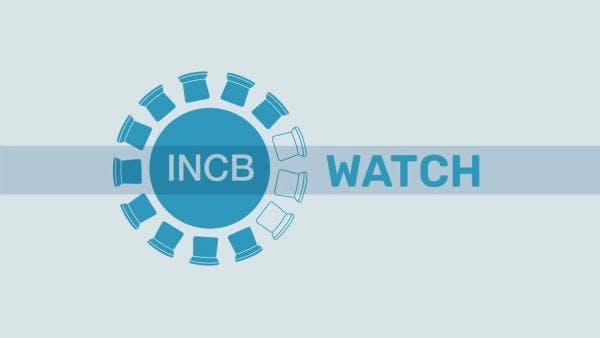Entrevista con el Dr. Lochan Naidoo en la Comisión de Estupefacientes
En una amplia discusión, Dr Naidoo, Presidente de la JIFE, reiteró algunas de las principales posiciones que la Junta ha asumido recientemente, enfatizando en el acceso a medicamentos esenciales.
Vea la entrevista, con subtítulos, aquí.
Más información, en inglés, está disponible abajo.
Suscríbase a las Alertas mensuales del IDPC para recibir información sobre cuestiones relacionadas con políticas sobre drogas.
At the 58th CND in Vienna in March 2015, Dr Lochan Naidoo, current President of the INCB, was interviewed by Ines Gimenez, IDHDP and IDPC Communications Officer.
In a wide ranging discussion, Dr Naidoo reiterated some of the main positions that the Board has taken up during recent years. The emphasis was on the period of his own presidency, which has been characterised by greater attention to the question of access to essential medicines. As evident in the interview, it is an issue about which Dr Naidoo feels passionate.
Other topics dealt with include addiction treatment, a field Dr Naidoo was engaged in for some 25 years in his native South Africa prior to taking up his role with the INCB. As for drug policy – 'It's not about stopping drugs', he says, 'it's about protecting people'. Adding that he wishes to 'put the human being at the centre of drug policy', he goes on to discuss the role and contribution of healthcare professionals in the policy field.
Drug treatment, he argues, should include the availability of injectable naloxone to prevent overdose deaths. While unwilling to use the term harm reduction, preferring to think of these services as 'part of a continuum of care', he appears to support many elements of the approach, including needle and syringe provision and opioid substitution treatment. The INCB adopts a long term view in respect to treatment, states Dr Naidoo, with eventual abstinence the objective. However, a welcome note of pragmatism is present: 'Not everyone will want to go to abstinence initially', he acknowledges, and 'in the meantime, we need to keep people alive'.
On the question of the international scheduling of ketamine, proposed by the Chinese government for the recent 58th Commission on Narcotic Drugs in Vienna, he contends that the INCB sees both sides of the controversy. He notes that the conventions allow for the provision of essential medicines such as ketamine in emergency situations 'without much red tape'. However, he is somewhat evasive in regard to the Board's record of continual advocacy of international scheduling over the past decade, and does not deal with the difficulties that such scheduling would pose in non-emergency situations, or in what might be termed the permanent state of emergency obtaining in rural parts of Africa and Asia, where even those drugs included in the lowest and supposedly most flexible schedules of the conventions are often very difficult or impossible to access.
Dr Naidoo responds to the question of cannabis, in both its recreational and medical uses. For the latter, he argues that randomised controlled trials should be used to test any medicinal compounds derived from cannabis, as is the case for any other medicinal drug. And as for recreational cannabis use, he states, this is one area of the conventions where there is no flexibility: controlled drugs can be used for medical and scientific purposes only.
Dr Naidoo closes by repeating two themes: the INCB's belated but welcome position of the use of the death penalty for drugs offences, and notes that he has yet to see any evidence that they work (i.e. by deterring potential traffickers), and the INCB's commitment to try to improve access to controlled medicines in the developing world.
Click here to read the full interview.
Keep up-to-date with drug policy developments by subscribing to the IDPC Monthly Alert.
Temas
Regiones
Perfiles relacionados
- International Narcotics Control Board (INCB)
